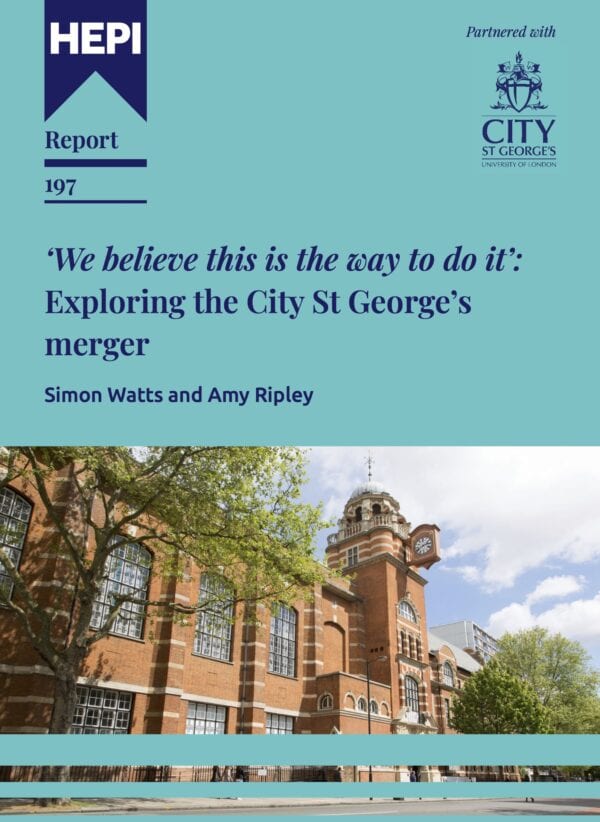Why institutions must protect personal academic tutoring at all costs
Join HEPI for a webinar on Thursday 11 December 2025 from 10am to 11am to discuss how universities can strengthen the student voice in governance to mark the launch of our upcoming report, Rethinking the Student Voice. Sign up now to hear our speakers explore the key questions.
This blog was kindly authored by Dr Gary Jones, Dean of Student Success and Experience, Scholars School System, Dr Steve Briggs, Director of Learning, Teaching and Libraries, University of Bedfordshire, Professor Graeme Pedlingham, Deputy Pro-Vice Chancellor for Student Experience, University of Sussex, Dr David Grey, UKAT Chief Executive Officer and Professor Abigail Moriarty, Pro Vice-Chancellor Education & Students, University of Lincoln.
A recent analytic induction study (Grey & Bailey, 2020) defined personal academic tutoring in UK higher education as a “proactive, professional relationship between student and tutor sustained throughout the entire student journey.” This partnership involves “dialogue, metacognition, and a structured programme of activities” aimed at fostering student agency, self-efficacy, independent learning, and career and future goals.
Personal academic tutors play a crucial role by supporting students to “assimilate to the university environment”, facilitating learning and decision-making, reviewing progress, and providing essential information. They enhance both academic ability and emotional well-being through holistic support during one-to-one or group meetings at key academic moments. Personal academic tutors are described as “knowledgeable, approachable, helpful, patient, caring, reliable and non-judgmental” staff members who possess the skills to actively listen, instruct, and advise. They play a crucial role in supporting student success and outcomes.
HE size and shape is changing
The increasingly perilous position of economic sustainability in the UK higher education sector has meant that a growing number of institutions are instigating reviews of their ‘size and shape’. In turn, many providers face some tough decisions around what should be prioritised. We anticipate that multiple university senior leadership teams may review academic workload plan allocations during the 2025/26 academic year to ensure that academic staff time can be optimised. As such, consideration may be given to changing time allocations to prioritise teaching preparation and delivery, assessment, and research over personal academic tutoring. We argue that teaching and research should not be treated as more important than personal academic tutoring when allocating time. Nor should teaching and research time be reduced in favour of personal academic tutoring. Rather, we argue for equivalency and that time allocation for personal academic tutoring is an activity institutions should seek to protect, not cut.
The value of university education has become a sharper and often more critical question in media narratives, as well as for people considering studying in higher education. With the increasing cost of living and studying at university, the question of how universities can make the benefits to students as visible as possible is understandably at the forefront of many of our minds. We argue that personal academic tutoring is a critical part of achieving this through a strategic, purposeful, proactive, and student-centred approach that is informed by data rather than risking falling into a reactive approach.
The impact and benefit of personal academic tutoring
Personal academic tutoring plays a fundamental role in enhancing attainment and impacts the Office for Students’ metrics, which determine institutional success (such as the Teaching Excellence Framework, National Student Survey and Postgraduate Taught Experience Survey). Effective tutoring can be measured in many ways, but not least of these is the positive benefits for helping students to stay on course and be successful, directly supporting those key B3 continuation and completion rates. Effective personal academic tutoring is therefore a virtuous circle for improving student outcomes and experience, and can help give direct evidence of value to both current students and potential applicants.
Meaningful individualised relationships that encompass the entirety of a student’s learning journey are fostered through effective personal academic tutoring. Successful tutors nurture a sense of belonging and mattering, aid in navigating the complexities of the higher education study experience, cultivate vital analytical and transferable skills, and impact student career aspirations and employability. At its best, personal academic tutoring transcends traditional teaching methods by facilitating purposeful, structured interactions outside of learning, empowering student agency and promoting the holistic development of all students. As highlighted by NACADA, teaching beyond the curriculum and discipline can help to bring together and contextualise students’ educational experiences in terms of extending aspirations, abilities and lives beyond campus boundaries and timeframes.
Academic workload planning and personal academic tutoring
A recent UKAT senior leaders’ network group meeting provided a forum for discussions regarding allocating dedicated resources for personal academic tutoring in universities. Here, we explored the variation and inconsistencies across the sector regarding how universities operate their personal academic tutoring in terms of academic workload planning. Members reported that across institutions, resource allocation was often determined locally but was driven by central university policy. As the group engaged in thought-provoking dialogue, a critical question emerged: If we genuinely value the importance of learning beyond the traditional subject curriculum, why is personal academic tutoring often not prioritised to the same extent as other activities in the initial stages of academic workload allocation?
The case for a personal academic tutoring first mindset
Recognising there are institutional differences, possible common ways of addressing this challenge were discussed, considering the aforementioned financial constraints facing the HE sector. Abi presented to attendees a cup metaphor for academic workload planning based on her previous work. This suggests that, given the significance of personal academic tutoring on student outcomes, personal academic tutoring time should be the first thing built into an academic’s workload plan. She noted, however, that this is often not the case and time allocation for personal academic tutoring may be the last thing added into the workload ‘cup’ (behind teaching, assessment and research), in turn causing the cup to overflow and damaging the significance associated with personal academic tutoring. There was an overwhelming consensus that we should all adopt a personal academic tutoring first ethos in terms of academic workload planning. Accordingly, we encourage readers who will be undertaking academic workload plan reviews over the coming months to reflect on how they allocate personal academic tutoring time, particularly if personal academic tutoring has not historically been the first pour into the workload cup.







Comments
Paul Wiltshire says:
But will it just be online?
Reply
Gavin Moodie says:
Thanx for drawing attention to this issue.
How many students does a tutor tutor? Might a university just increase the number of students tutors tutor?
‘At all costs’ is a very strong statement.
Reply
Jonathan Alltimes says:
“Many subjects of instruction naturally divide themselves. Latin and Greek composition, written exercises generally, would fall under the superintendence of the College Tutor, whose business it would be to take up and perfect the education of school. Ethical and Logical Science could be as well or better taught, in Professorial Lectures after the first elements of them had been received from the College Tutor. The object of a Professor is not so much to obtain crowded classes, as to give a higher kind of instruction. It would destroy the character of Professorial teaching to make the Professor a Tutor to poor Students, who from their imperfect previous education stand in need even more than other Students of individual assistance.” (Source: Benjamin Jowett’s evidence to the Royal Oxford University Commission of 1852.)
Jowett makes the distinction between codified exercises for the basic particulars of interpretation and good form, with spoken instruction for the advanced causal, empirical, and logical method of reasoning. The tutor improves the weaknesses of schooling, so ends when the student follows the first principles. Neither the medieval lawyers’ art of rhetorical argument as disputation after Aristotle nor the Socratic method as dialectical argument after Plato is made explicit. We can only assume as Jowett was a classicist, he would have used and taught these methods. The division of related subjects as a progression is a crucial didactic princple, as is the faculty as examples of how to learn. Pedagogy is moral.
Reply
Add comment